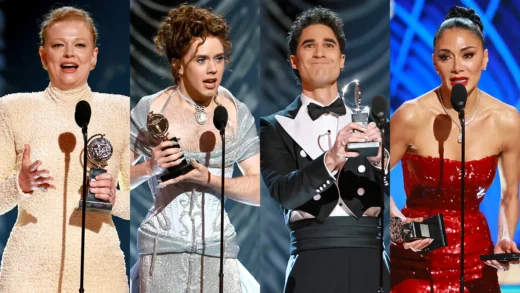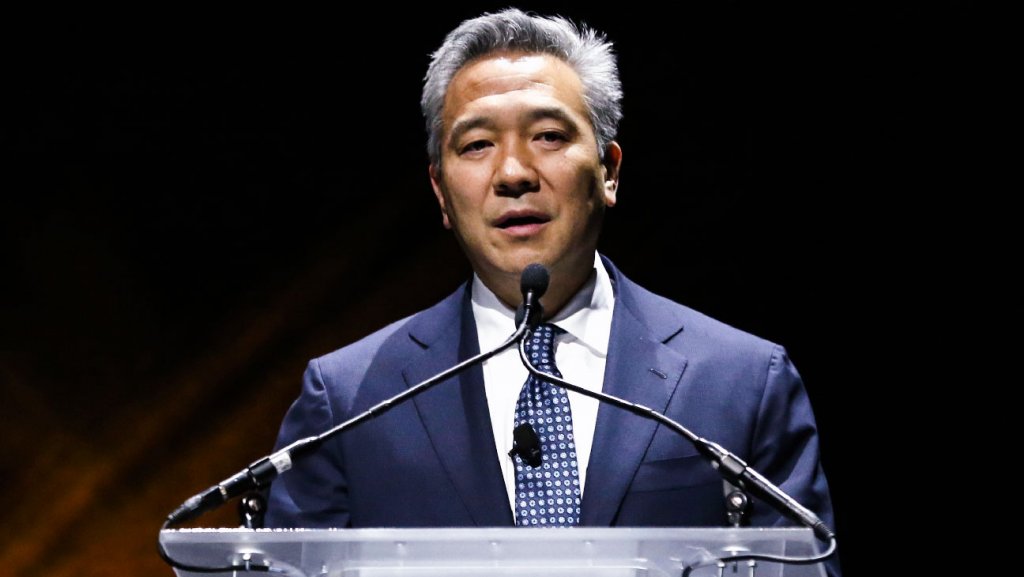Kevin Tsujihara is exiting his role as chairman and CEO of Warner Bros. Entertainment, a job he’s held for six years.
“It is in the best interest of WarnerMedia, Warner Bros., our employees and our partners for Kevin to step down as Chairman and CEO of Warner Bros.,” said WarnerMedia CEO John Stankey on Monday. The executive did not name a replacement for Tsujihara.
Stankey added, “Kevin has contributed greatly to the studio’s success over the past 25 years and for that we thank him. Kevin acknowledges that his mistakes are inconsistent with the Company’s leadership expectations and could impact the Company’s ability to execute going forward.”
In a Hollywood Reporter article on March 6, text messages between the executive and Charlotte Kirk revealed that Tsujihara said that he would push for auditions for the actress amid an apparent sexual relationship that he was having with her. The actress appeared in two Warner Bros. films: 2016’s How to Be Single and 2018’s Ocean’s 8. Tsujihara’s personal attorney stated, “Mr. Tsujihara had no direct role in the hiring of this actress.” An outside law firm continues to investigate the claims made against Tsujihara.
In a separate memo Tsujihara sent to Warner staffers today, he said that after reflecting “on how the attention on my past actions might impact the company’s future,” he had decided to step down. He added that “it has become clear that my continued leadership could be a distraction and an obstacle to the company’s continued success. The hard work of everyone within our organization is truly admirable, and I won’t let media attention on my past detract from all the great work the team is doing.”
Tsujihara’s departure comes as John Stankey, named CEO of WarnerMedia in 2017, puts his stamp on the company in the wake of the AT&T’s $85 billion to $105 billion acquisition of Time Warner, which was approved last spring and then upheld by a federal appeals court last month. In a major reorganization, announced March 4, Tsujihara had been given additional oversight responsibilities, including of a new kids and young adults business — bringing together family, kids and animation businesses from across WarnerMedia, including Cartoon Network, Adult Swim and Boomerang — as well as Otter Media, Turner Classic Movies and all activities around licensed consumer products development for WarnerMedia properties.
Tsujihara, 54, the first executive of Asian descent to head a major Hollywood studio, was promoted to his current post after then-Time Warner chairman and CEO Jeff Bewkes staged a months-long executive bake-off among Tsujihara, who at the time oversaw home entertainment; Warner Bros. Television president Bruce Rosenblum; and Warner Bros. Pictures president Jeff Robinov. Following Tsujihara’s elevation, both Robinov and Rosenblum left the company.
Under Tsujihara’s tenure, Warners had struggled to turn out DC superhero movies that matched the success of Disney’s Marvel label until it hit upon a winning formula with 2017’s Wonder Woman, directed by Patty Jenkins and starring Gal Gadot, which took in $821.8 million worldwide. It then enjoyed an even bigger success with last year’s Aquaman, directed by James Wan and starring Jason Momoa, which has grossed $1.1 billion worldwide, eclipsing all of Warners’ earlier superhero movies, including those in Christopher Nolan’s Dark Knight trilogy.
Tsujihara is also credited with courting J.K. Rowling for a series of Harry Potter spinoff movies. The first installment, Fantastic Beasts and Where To Find Them, grossed $814 million in 2016, although its 2018 sequel Fantastic Beasts: The Crimes of Grindelwald stalled at $653.4 million. A third installment is slated for 2021.
In January of last year, Tsujihara put Toby Emmerich, who had previously headed the studio’s New Line unit before becoming president of the studio in 2017, in charge of the motion picture group. Last year, the studio grossed $5.8 billion in worldwide box office grosses to record its biggest year ever.
During his tenure, Tsujihara turned to Brett Ratner’s RatPac-Dune Entertainment to help finance a slate of films, striking a four-year deal in 2013 for $450 million in funding for 75 features. After Ratner was accused of sexual misconduct in 2017, the studio cut ties with the producer and opted not to renew the RatPac-Dune deal last year, finding other sources of financing such as a deal with Bron Studios to co-finance six films. As AT&T gets ready to offer its own WarnerMedia streaming service next year, Warners recently bought back RatPac-Dune’s minority stake in such films as Wonder Woman, Dunkirkand It for $290 million.
Tsujihara has also taken a leading role in negotiating with theater owners to allow premium, in-home viewing of movies.
On the television side, Tsujihara left day-to-day management of the studio’s sprawling portfolio to company veteran Peter Roth, but its track record is still a feather in Tsujihara’s cap. The studio is responsible for half of the youth-skewing CW network, reigning broadcast comedy The Big Bang Theory and distributing syndicated megahit The Ellen DeGeneres Show — as well as dozens of original scripted and unscripted series. It remains a lightning rod for talent, recently snapping up longtime Universal loyalist Mindy Kaling for a rich overall deal.
WarnerMedia’s play for its own streaming platform has produced a particularly interesting narrative on the TV side, shining a light on the studio’s deep library of hits — just as valuable as its new offerings in the current climate. For example, despite a recent extension with Netflix, Friends, the Warner Bros. crown jewel, is expected to eventually stream exclusively on the upcoming platform.
Tsujihara joined Warners in 1994 as director of special projects, finance, to assist in the management of the company’s interest in Six Flags. Across his nearly two decades with the company, he has served as an executive vp corporate business development and strategy at Warner Bros. Entertainment and executive vp new media, responsible for the oversight of all Warner Bros.’ new-media endeavors. He picked up experience managing home video, digital distribution, video games and emerging technology when he was named president of Warner Bros. Home Entertainment Group in 2005.
(Excerpt) Read more in: The Hollywood Reporter





